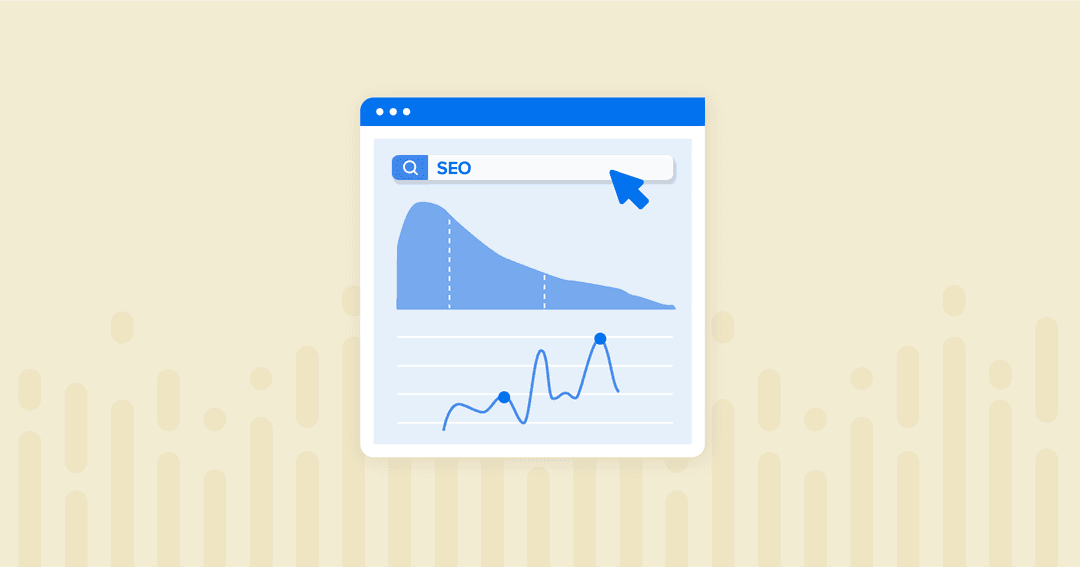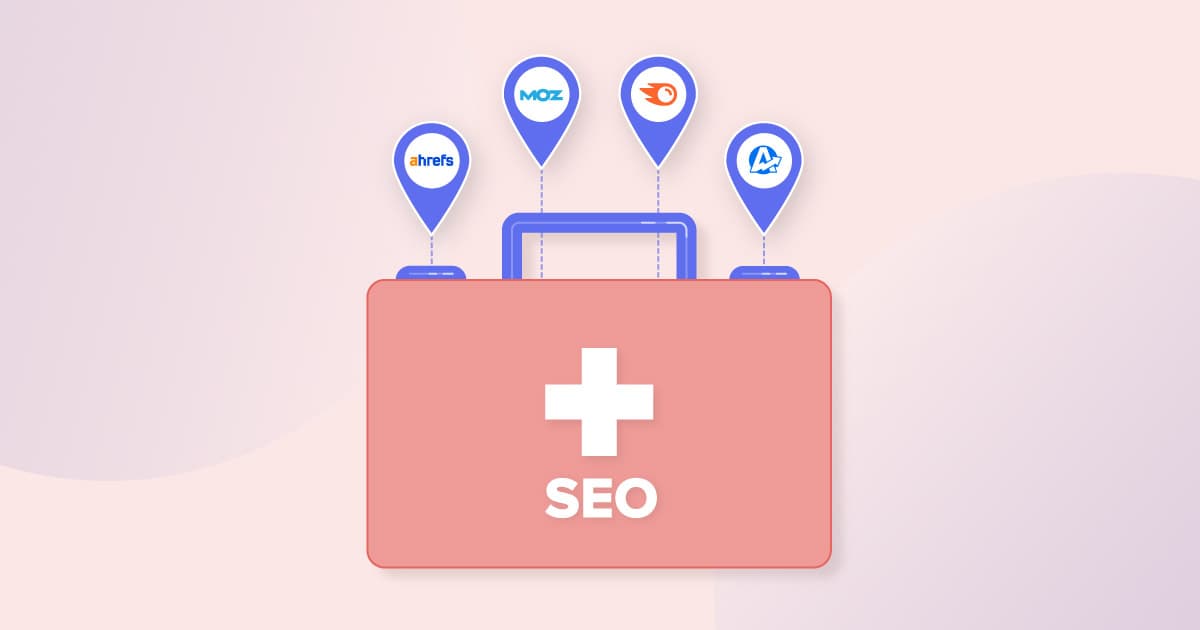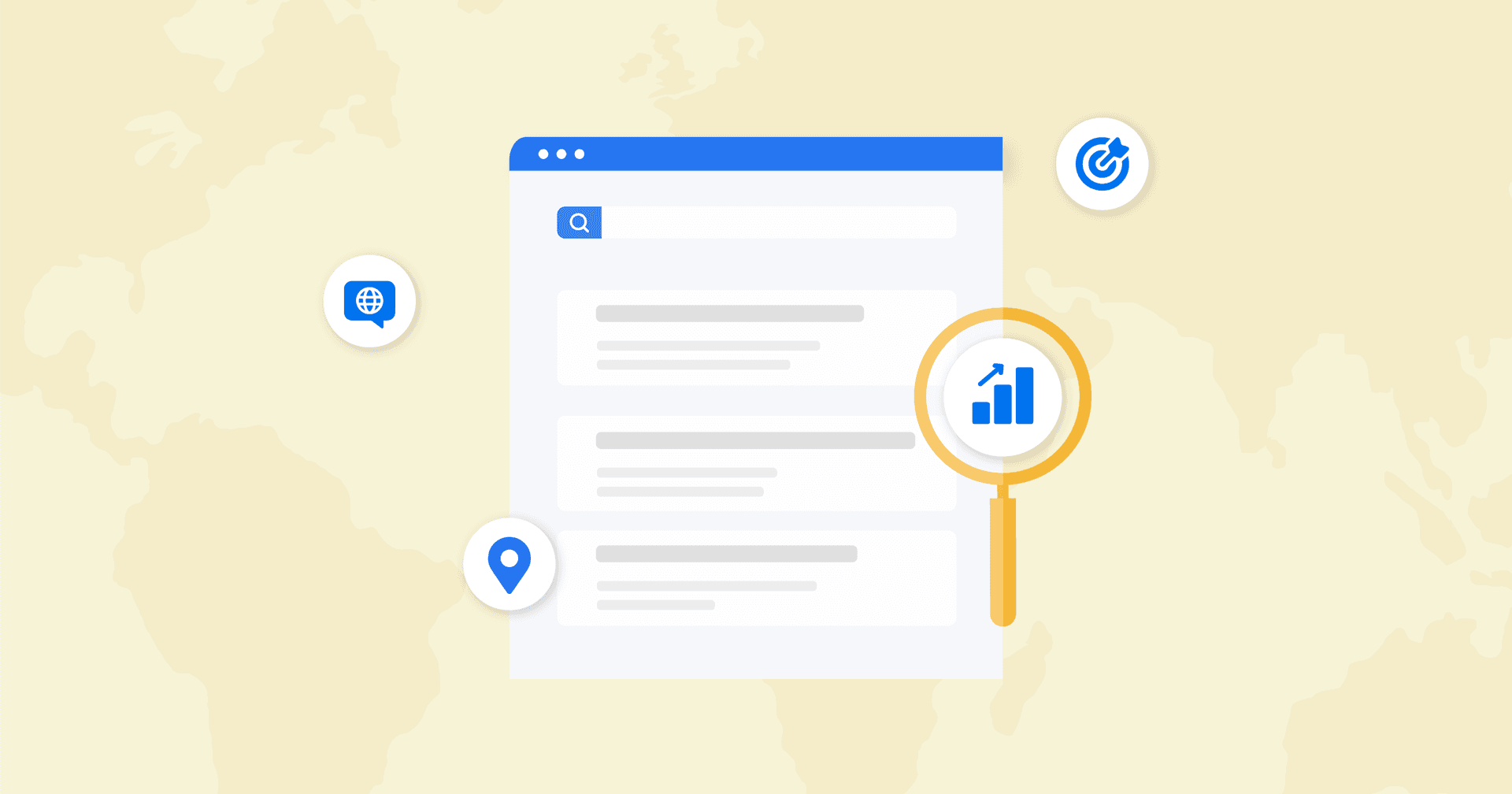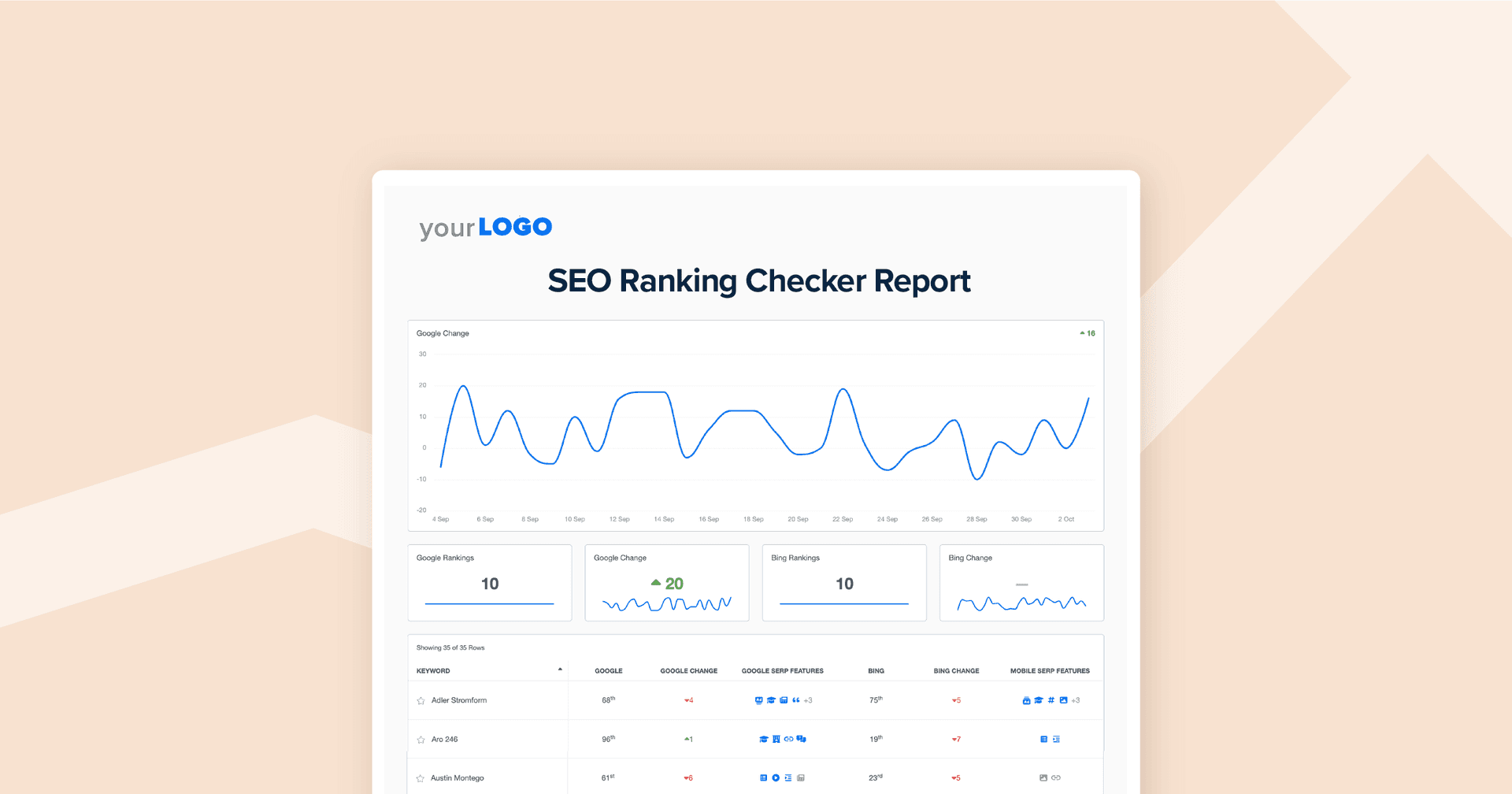Table of Contents
QUICK SUMMARY:
SEO benchmarking evaluates your client’s website against competitors and industry standards. This creates a measurable starting point, enabling your agency to track ranking trends, identify improvement areas, and set goals that deliver meaningful results. In this article, we detail 5 key SEO benchmarks, along with suggestions for how to easily share these benchmarks with clients (and explain their relevance).
Keeping up with client expectations in SEO isn’t easy. Your clients want it all—higher rankings, more traffic, better engagement—and they want it yesterday. SEO benchmarking helps you tackle this challenge head-on, showing exactly how your clients measure up to their competitors and industry standards.
Think of it as a health check for their online presence. What’s working? What’s falling flat? And where’s the untapped potential? Benchmarking SEO performance helps you spot opportunities, identify gaps, and provides the insights your agency needs to craft strategies that deliver real results.
In this guide, we’re breaking it all down—exploring the differences between metrics, keywords, and essential benchmarks that highlight your impact, validate your expertise, and keep those "We wish we hired you sooner!” emails rolling in.
What Is SEO Benchmarking?
Search engine optimization (SEO) benchmarking is a bit like an SEO report card but instead of grades, you get insights into how your client’s website stacks up against others in their field. Are your clients ranking well for their target keywords? Is their website’s organic traffic as high as their competitors? SEO benchmarks answer these questions, giving you the data you need to show clients where they’re excelling—and where there’s room to grow.
The Difference Between Benchmarks and Key Performance Indicators (KPIs)
What makes SEO benchmarks different from the countless SEO KPIs your agency is already tracking? An SEO benchmark gives you a clear picture of industry standards—like pace times in a marathon—so you see how your client measures up against their competitors. SEO Key Performance Indicators (KPIs), on the other hand, are customized goals set specifically for each client’s unique strategy. These measurable targets reflect progress toward individual client goals rather than industry standards.
So while SEO benchmarks show your clients how they stack up against the competition, KPIs are more about tracking progress toward your client’s unique goals—whether that includes steadily improving search visibility or reducing organic traffic bounce rates.
By clearly distinguishing between these metrics and using them effectively, your agency demonstrates where your clients currently stand, where they should be based on their business objectives—and most importantly, how your agency's strategy will bridge the gap to get them there.
Lagging vs. Leading Metrics
To get the most out of SEO benchmarking, it’s key to understand the difference between lagging and leading metrics.
Lagging Metrics: These metrics act like your rearview mirror, showing you what’s already happened—like last month’s traffic acquisition or conversion rates. When used as a baseline, lagging metrics help you evaluate past SEO performance—uncovering strategies that worked and others that missed the mark.
Leading Metrics: If lagging metrics show you how far you’ve come, leading metrics help you predict where you’re headed—kind of like a GPS. Forward-looking metrics like page load speed or keyword rankings, show your clients where their strategy is headed and make it easier to spot when things aren’t on track—so you can make the necessary adjustments to reach your final destination.
Before You Get Started
Before you dive into all things SEO benchmarking, here’s a tip: just because you have the ability to track everything, doesn’t mean you should. Not every product, page, or keyword deserves the spotlight. Why? Focusing on too many keywords at once is like trying to read five books simultaneously—you end up confused, overwhelmed, and missing the best chapters.
Instead, focus on the ones that align with your client’s overarching goals and have the most potential to drive results. Here are a few ways to narrow down your focus:
Decide Which Products and Pages To Promote
Start by identifying the products and pages that are most likely to make an impact. To help you determine which products and pages deserve the VIP treatment, ask yourself these questions:
What are the client’s core products or services? Start with the big hitters, like their main offerings and high-ticket items. Focusing on the pages most likely to bring in leads will maximize your results.
Which pages have strong conversion potential? Some pages are just natural closers—like service descriptions, contact forms, or key blog posts. These are your hot pages and deserve a little extra SEO love.
Are there seasonal or trending products? If your client offers products that are hot for certain seasons or based on trends, these pages should be prioritized too. Catching the wave at just the right time will give their traffic a major boost.
Determine Keyword Priorities
When it comes to SEO benchmarks, not all keywords are created equal. To drive meaningful results, target keywords that directly align with your client's goals and have the highest potential to convert.
For example: If your client is a startup focused on growing online software subscriptions, prioritize product pages and keywords that capture high-intent searches, such as “best project management software.” On the other hand, if the goal is to boost awareness for a new Italian restaurant in your area, focus on local pages and location-based keywords like “Italian restaurant near me.”
Once you’ve set the broader focus, the next step is identifying the most impactful keywords. Here’s how:
Identify High-Intent Keywords: Look for keywords that show users are ready to buy or take action. These are your money-makers, like “best Mexican restaurant near me” or “affordable office furniture.”
Focus on Core Industry Terms and Niche Keywords: While high-traffic keywords are valuable, don’t ignore more niche terms with lower volume but high relevance.
Analyze Competitor Keyword Focus: Study competitors’ top-ranking keywords to see where you might be missing opportunities. Are they emphasizing product features, benefits, or specific services? Tools like Google Analytics and various SEO competitor analysis tools reveal the keywords driving traffic to their pages and their visibility in Google search results—helping you identify gaps and refine your client’s strategy.
While rankings are important, they are only a means to an end. We understand that our clients don't just want to rank #1 for a search term. They want leads. This is why we focus on strategies that drive real business results and not just rankings.
Kurt Schell, President, Lithium Marketing
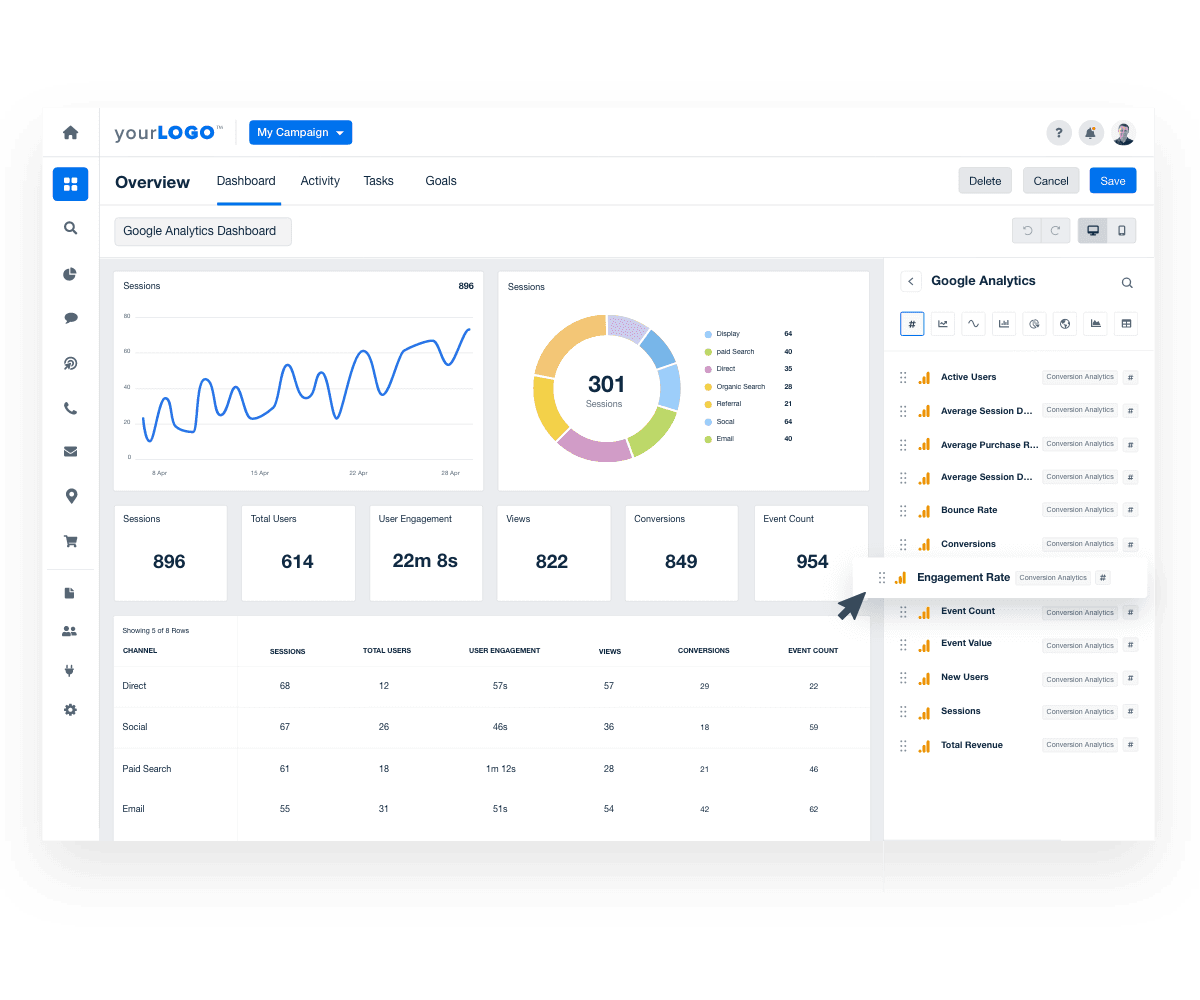
Agency Tip: Want to skip the hassle of manual sorting? Simplify the process with AgencyAnalytics’ GA4 Reporting Tool—track live metrics, historical data, and create custom dashboard with easy drag and drop functionality. Sign up for your free trial today!
Research the Competition
SEO benchmarking isn’t about doing it all—it’s about doing what matters most and doing it better than anyone else. Here’s how to make competitor analysis your ultimate power move:
Identify Key Players: Start by analyzing direct competitors targeting the same audience in your client’s niche. Then, expand your scope to aspirational competitors. These are the ones making waves in a related space. Why study both? It gives you a broader picture of what’s working, so you can spot trends, borrow bold moves, and ensure your client isn’t just keeping up—they’re setting the pace.
Compare Backlinks and Site Authority: Take a closer look at the content and backlinks fueling your competitors’ success. Are they scoring links from high-trust sites or teaming up with local businesses? Spotting these trends allows your team to craft a sharper, smarter link-building strategy that boosts your client's domain authority.
Find High-Performing Keywords and Pages: Dig into the data to identify the keywords and pages driving traffic for your client’s competitors. Is their blog stealing the spotlight? Are they dominating local search? These insights will help you find the gaps your client can fill and own.
Analyze Site Structure and Content Strategies: Peek under the hood of your clients' competitors’ sites to uncover what’s working—and what’s not. Are they wooing users with sleek navigation? Publishing long-form guides that rank high on Google? Or maybe their content has some cracks your client can strengthen. Use these insights to craft a strategy that sets your client apart.
Research the customer's needs, requirements, and expectations. Show them the competition and what they are up against.
Andrew Thomas, Technical Director, HookedOnMedia
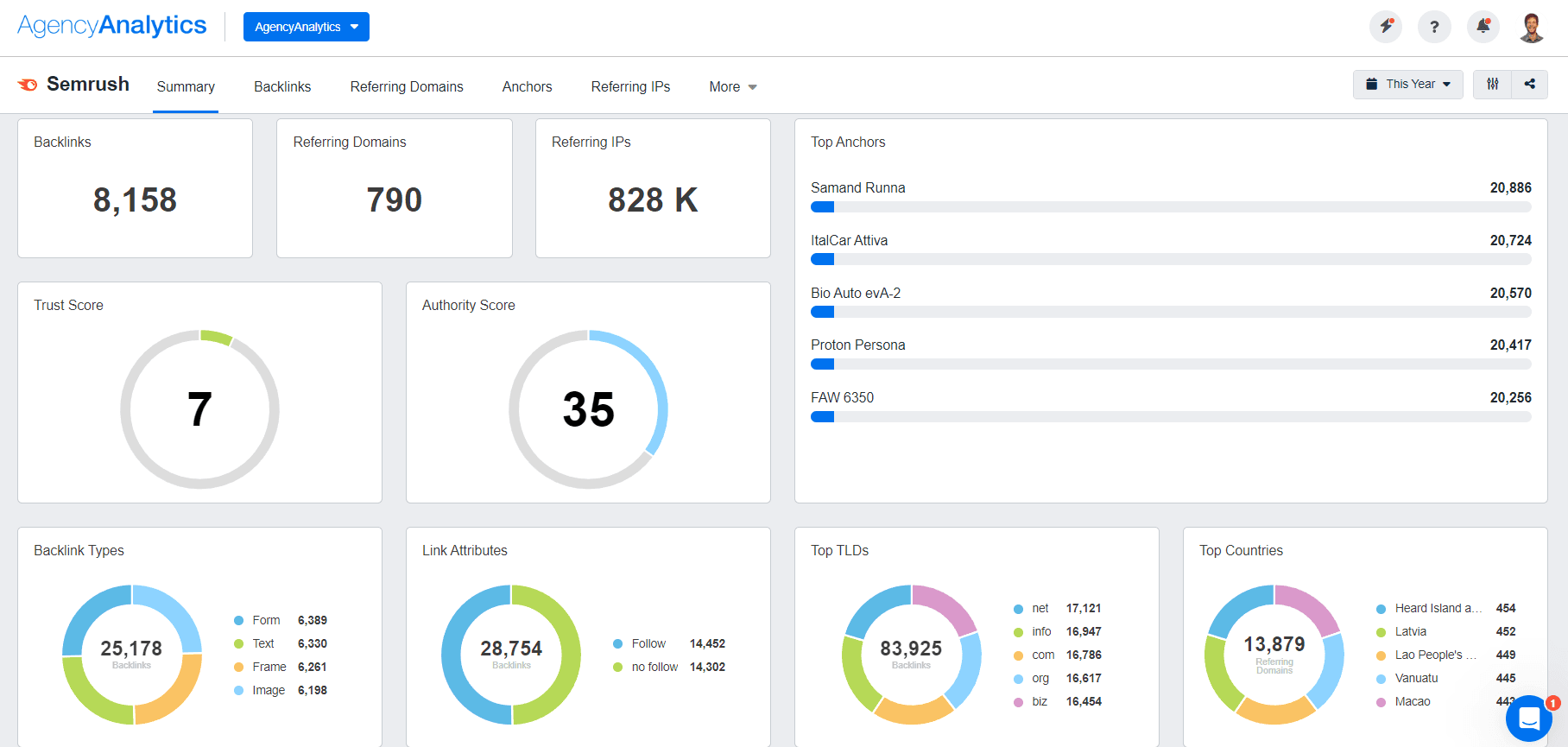
Pull data from Semrush straight into a client-facing SEO reporting dashboard, in seconds flat! Create white labeled SEO dashboards in just a few clicks with Smart Dashboards from AgencyAnalytics. Try it free for 14 days!
5 Key SEO Benchmarks
With all the groundwork in place, it’s time to establish your client’s SEO benchmarks and start tracking progress. But where should you focus? It all comes down to SEO tracking and monitoring the right metrics, tailored to your client’s goals—whether it’s driving conversions for an ecommerce brand or generating buzz for a non-profit.
These essential benchmarks serve as the foundation of a successful SEO strategy, allowing you to track progress, refine approaches, and deliver results that support your clients’ sustained growth.
1. Organic Search Traffic
Organic traffic is the heartbeat of SEO—and what keeps the whole strategy alive and kicking. Keep a close eye on how much traffic is coming to your client’s site from organic search channels and other non-paid sources. If those numbers are climbing, you’re winning. If they’re flatlining or dropping, it’s a signal to reassess, fine-tune, and inject fresh tactics to get things moving in the right direction.
2. Keyword Rankings
If organic traffic is the “destination,” keyword rankings are the “roadmap.” A keyword rank tracker will show how visible your client’s site is for those critical search terms that drive traffic. A steady climb in keyword positions indicates your SEO efforts are hitting the mark, while drops shine a light on areas that may need some work.
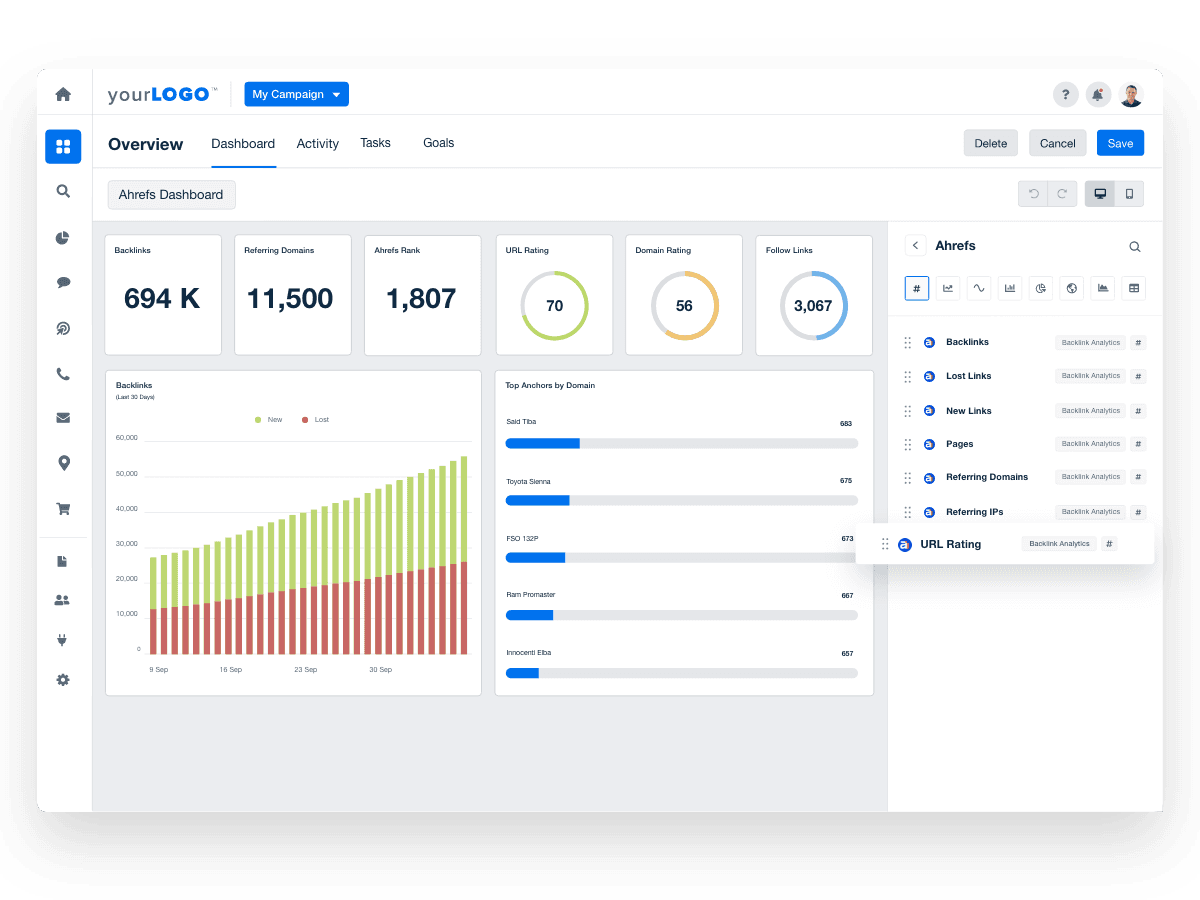
Want to make it easier to track keyword rankings? AgencyAnalytics’ SEO reporting tools put keyword rankings and essential SEO metrics at your fingertips—and you can try it out for 14 days completely free!
3. Click-Through Rate (CTR)
Click-through rate (CTR) is the ultimate reality check—it shows how often users click through to your client’s landing pages from different search engine results pages. High impressions but a low CTR? That’s your cue to give those meta titles and descriptions a makeover. The silver lining? Boosting CTR is a quick, low-effort win that drives more traffic without requiring major changes to their website’s search engine rankings—a result your clients will notice and appreciate.
4. Bounce Rate and Dwell Time
Bounce rate and dwell time are key SEO metrics for content engagement. High organic traffic bounce rates and low dwell time? That’s a tell-tale sign that your content isn’t meeting user search intent and could use a little polish. On the flip side, a lower bounce rate means visitors are sticking around. For an ecommerce client, that could mean they’re exploring products, and for a service-based client, it shows potential customers are digging deeper to learn more. Either way, it’s your green light that something’s working.
5. Backlink Profile
Backlinks are the ultimate credibility flex in SEO, but creating a strong blacklink profile isn’t just about quantity—quality matters even more. When reputable sites link to your client’s content, it acts as a stamp of approval that search engines can’t ignore. This helps your clients meet crucial backlink profile benchmarks and steadily boosts their traffic over time.
While these metrics aren’t exhaustive, they serve as an essential starting point—making it easy to track progress, adjust SEO strategies when needed, and highlight the wins that matter most to your clients.
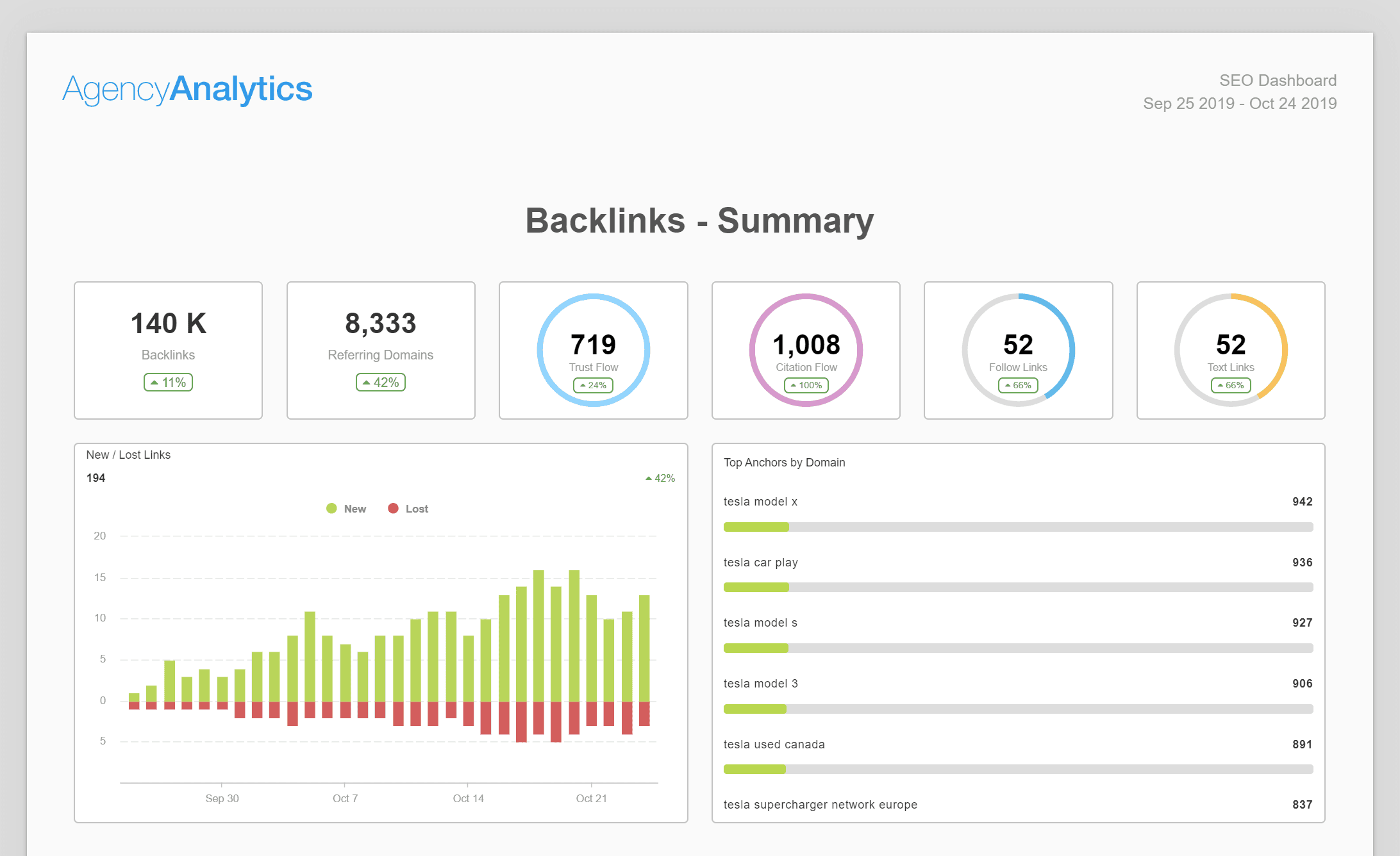
Want to share your wins without the wait? With AgencyAnalytic’s Backlink Monitor, track backlink profile progress and keep clients informed. Start your free 14-day trial now.
How To Show SEO Benchmarks to Clients
SEO reporting isn’t about throwing a pile of numbers at your clients—at least, it shouldn’t be. It’s your chance to tell the story of how far their SEO strategy has come, highlight their successes, and get them excited for what’s next. But manually compiling SEO reports for multiple clients? That’s a time sink no agency can afford.
AgencyAnalytics makes it easy to transform raw data into meaningful insights that clients understand and value. Here’s how:
Benchmarks, Forecasting, and Anomaly Detection
The new Insights features from AgencyAnalytics make it easy to keep track of SEO benchmarks on an ongoing basis. Using data from more than 7,000 marketing agencies, real-time, up-to-date industry benchmarks are just a click away.
Use the benchmarks feature to show clients exactly how they stack up against the competition. Filter by industry to provide even greater accuracy for each metric you’re tracking.
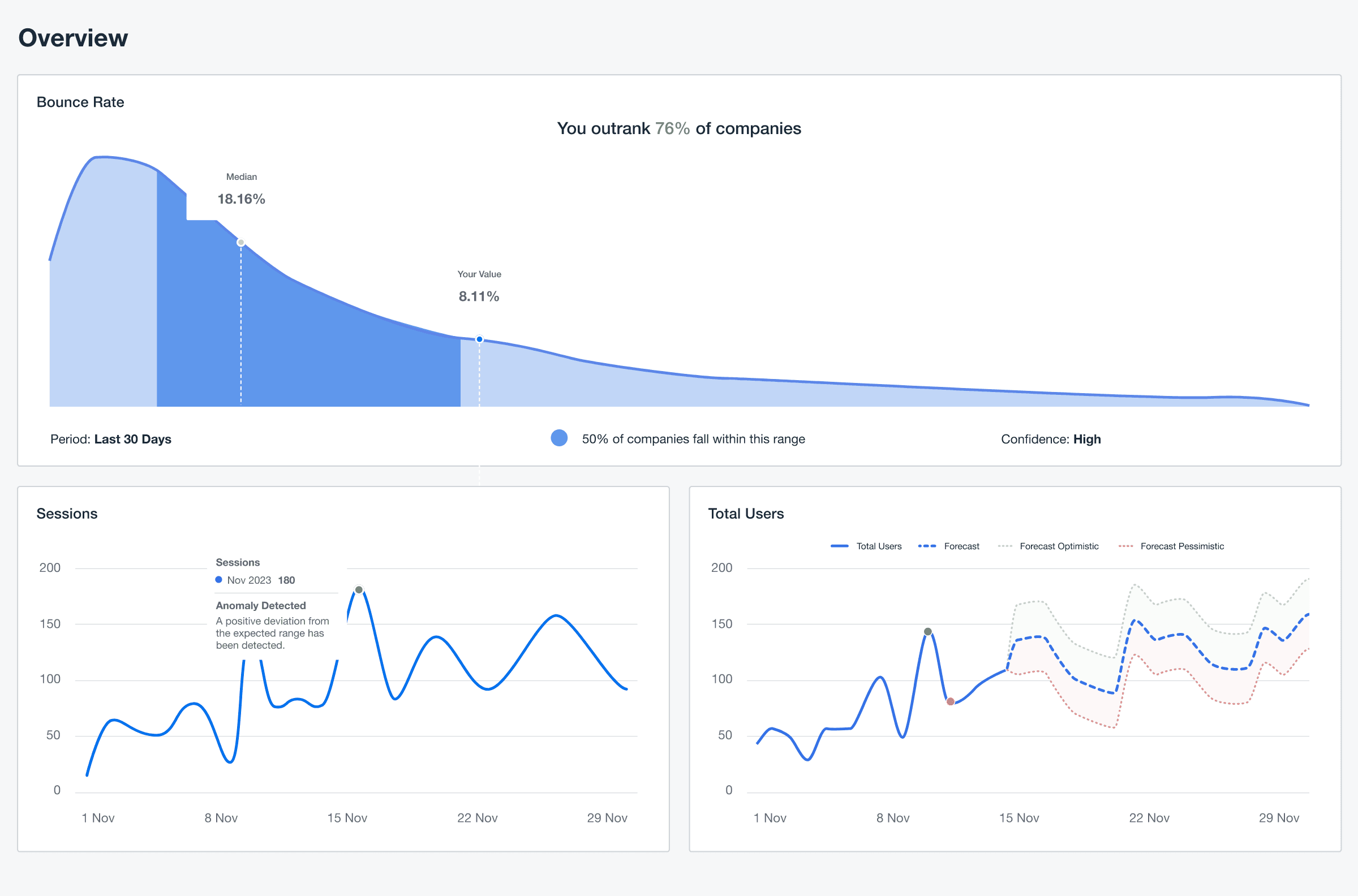
With predictive forecasting, it’s easy to take the data a step further, and illustrate both optimistic and pessimistic performance scenarios. Share the data with clients to emphasize the “why” behind your SEO strategies.
We handle SEO issues by educating the customer on why their current budget is too low for their industry and why they are currently not getting any results due to budget constraints.
Anatoly Zadorozhnyy, CEO, Marketing 1on1
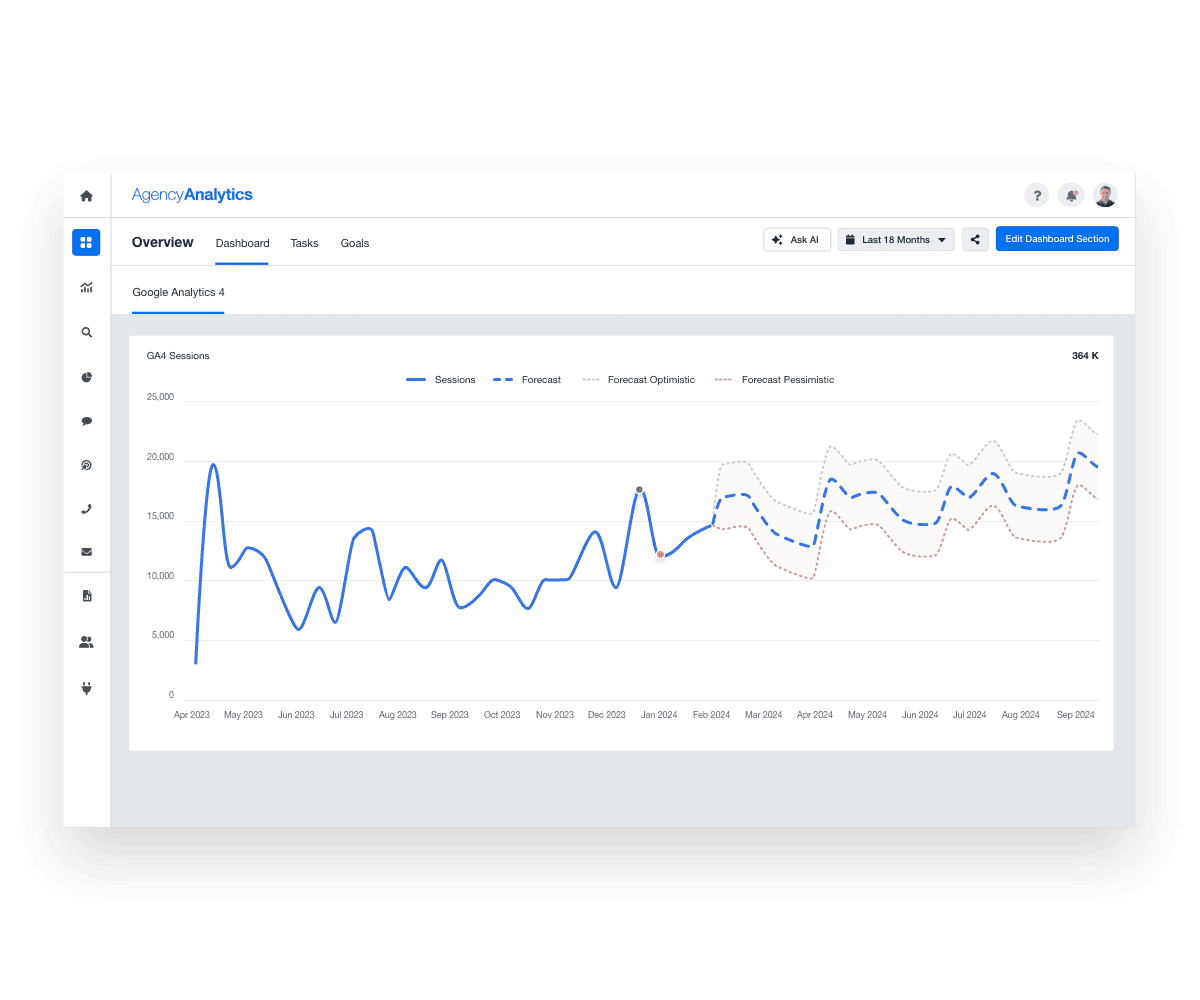
For the most important SEO benchmarks, use the anomaly detection feature to quickly identify unusual data patterns, so your agency can act on them–fast.
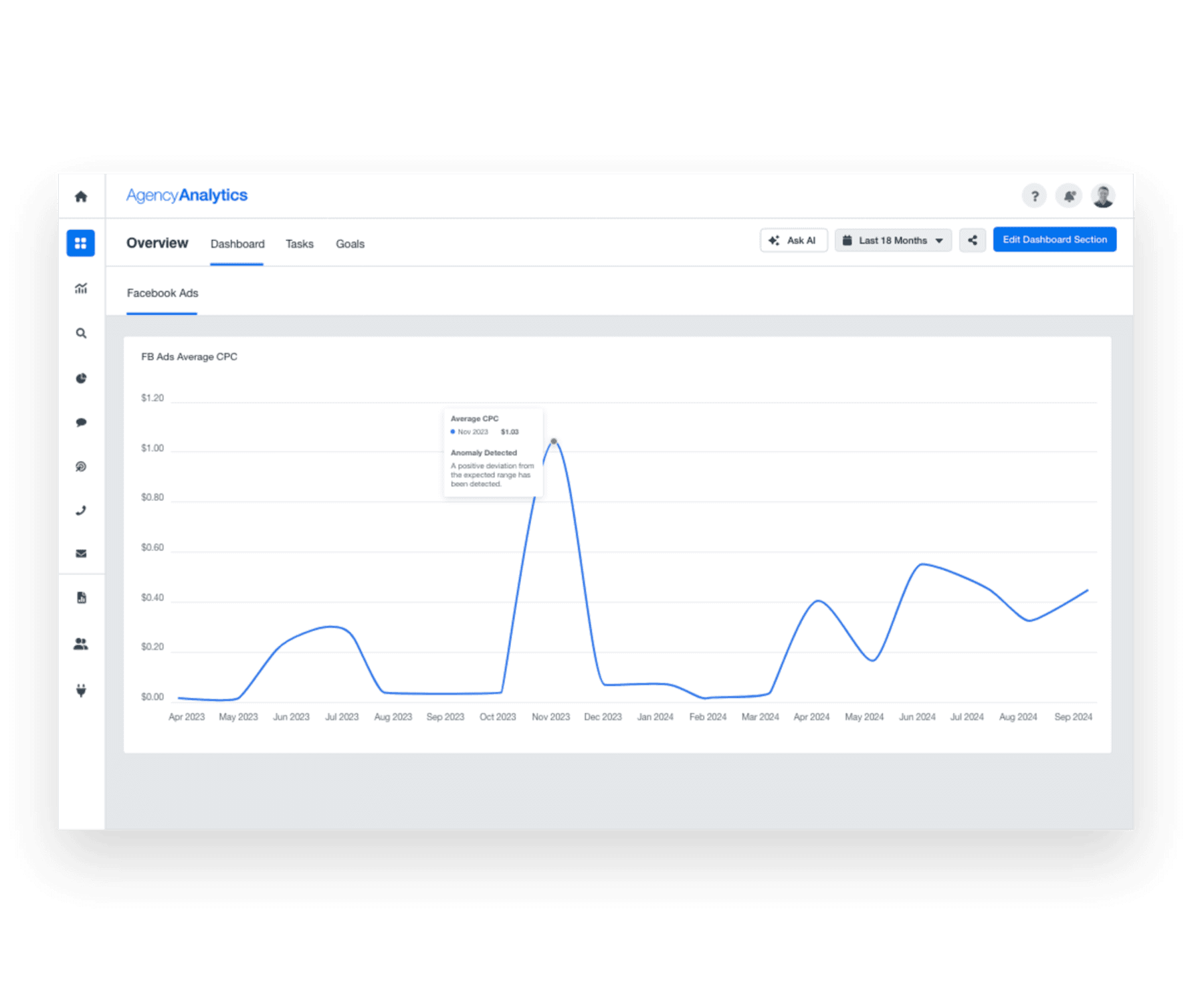
Get started with SEO Benchmarks, Forecasting, and Anomaly Detection today! Sign up for your free 14-day trial with AgencyAnalytics.
Custom Dashboards
Customizable dashboards with clear visuals highlight the specific metrics your clients should be focusing on, helping them grasp progress and stay engaged. Here are a few features that showcase your SEO success:
SEO Audit Tools: Create a comprehensive report on your client’s website health, making it easy for them to see technical improvements over time.
Backlink Monitoring: Track referring domains and backlinks to give clients a clear view of their growing authority.
Keyword Tracking: Easily monitor your client’s organic search visibility, provide detailed reports on keyword rankings, and track search engine rankings across search engines.
Ask AI and AI Summary
SEO data can be overwhelming, especially when you’re trying to communicate its value. That’s where the AI Reporting Tools, Ask AI, and AI Summary step in. These two powerful tools simplify reporting, so you can spend less time analyzing and more time strategizing.
Ask AI: Whether you’re spotting trends, uncovering opportunities, or celebrating wins, Ask AI instantly analyzes your client’s SEO data and delivers clear, easy-to-understand takeaways. No more data overload—just answers that are right to the point.
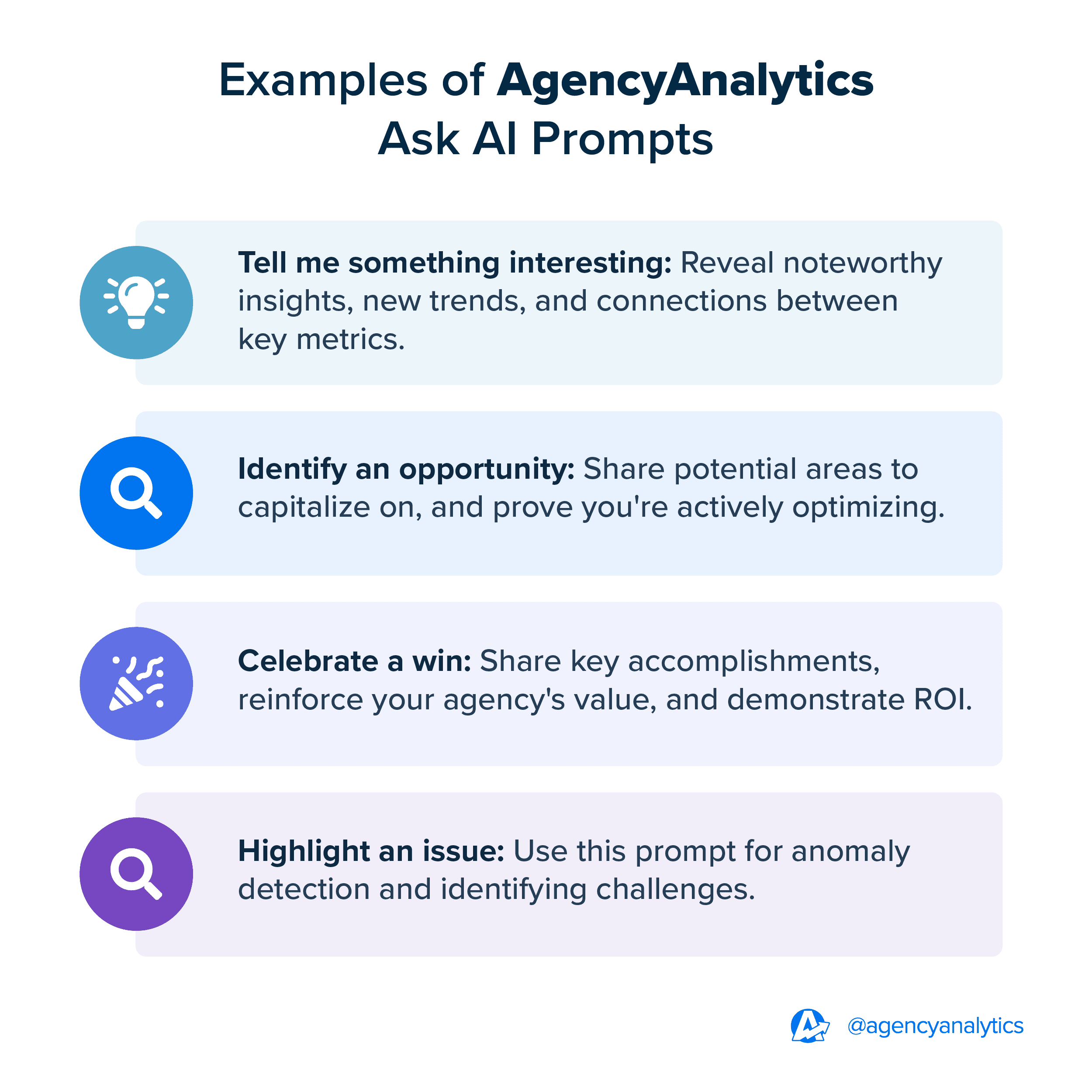
AI Summary: Need a quick snapshot of your client’s SEO progress? AI Summary generates high-level overviews in seconds. The best part? Easily drag these summaries directly into your reports or dashboards to give clients a clear, concise view of their progress—saving time while delivering professional, actionable insights.
Smart Reports for Quick Highlights
AgencyAnalytics' Smart Reports pull key metrics from your client’s connected integrations—whether it's SEO, PPC, ecommerce, or social media. This automation saves valuable billable hours by dramatically reducing the time to create a report or dashboard–right down to 11 seconds.
Turning Insights Into Action: How SEO Benchmarking Drives Client Success
For agencies, SEO benchmarking is more than reporting numbers—it’s an opportunity to demonstrate value, refine strategies, and deliver results that keep clients coming back. With these key SEO benchmarks, your agency will outpace the competition and set a new standard for success.
Ready to lead the way? AgencyAnalytics’ Benchmarking features provide the tools your agency needs to track SEO performance, uncover insights, and deliver reports your clients understand and value. Start transforming your clients’ SEO strategies with actionable, data-driven insights today!

Written by
Kali Armstrong is a freelance content writer with nearly a decade of experience crafting engaging, results-driven copy. From SEO blogs to punchy short-form pieces, she combines strategic insight with authentic messaging to captivate audiences and drive results.
Read more posts by Kali ArmstrongSee how 7,000+ marketing agencies help clients win
Free 14-day trial. No credit card required.



